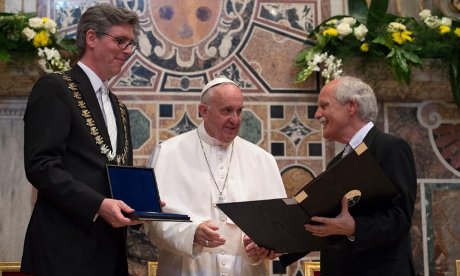Echoing Martin Luther King, Pope Francis has offered a vision of a revitalised Europe at a critical moment in its history.
On Friday, Francis gave a thunderous speech after accepting the prestigious German Charlemagne Prize, which is for “services of Western European understanding and work for the community”.
The Pontiff criticised a “resignation and weariness that do not belong to the soul of Europe”.
He asked of Europe three times “What has happened to you”?
Echoing the famous “I have a dream” speech by US civil rights leader Martin Luther King, Francis offered his vision of Europe.
“I dream of a Europe where being a migrant is not a crime but a summons to greater commitment on behalf of the dignity of every human being,” Francis said.
“I dream of a Europe that promotes and protects the rights of everyone, without neglecting its duties towards all,” he continued later.
“I dream of a Europe of which it will not be said that its commitment to human rights was its last utopia.”
The Pope said this at a ceremony attended by Italian Prime Minister Matteo Renzi, King Felipe and Queen Letizia of Spain and German Chancellor Angela Merkel.
In his speech, Pope Francis urged Europeans to undergo a “memory transfusion”, citing a phrase by Holocaust survivor Elie Wiesel, to remember Europe’s fractured past when confronting issues that threaten again to divide it.
The Pope urged the birth of a “new humanism” based on capacities to integrate, dialogue, and generate.
He strongly condemned current calls for uniformity, or arguing against integration of new ideas or peoples.
He also said youth unemployment was sapping the continent of its dynamism, and he called for new economic models that are “more inclusive and equitable”.
Francis urged European leaders to reject calls for re-nationalisation, to remember the devastating history that preceded their unification, and to “build bridges and tear down walls” in the face of the continuing migrant crisis.
Sources
